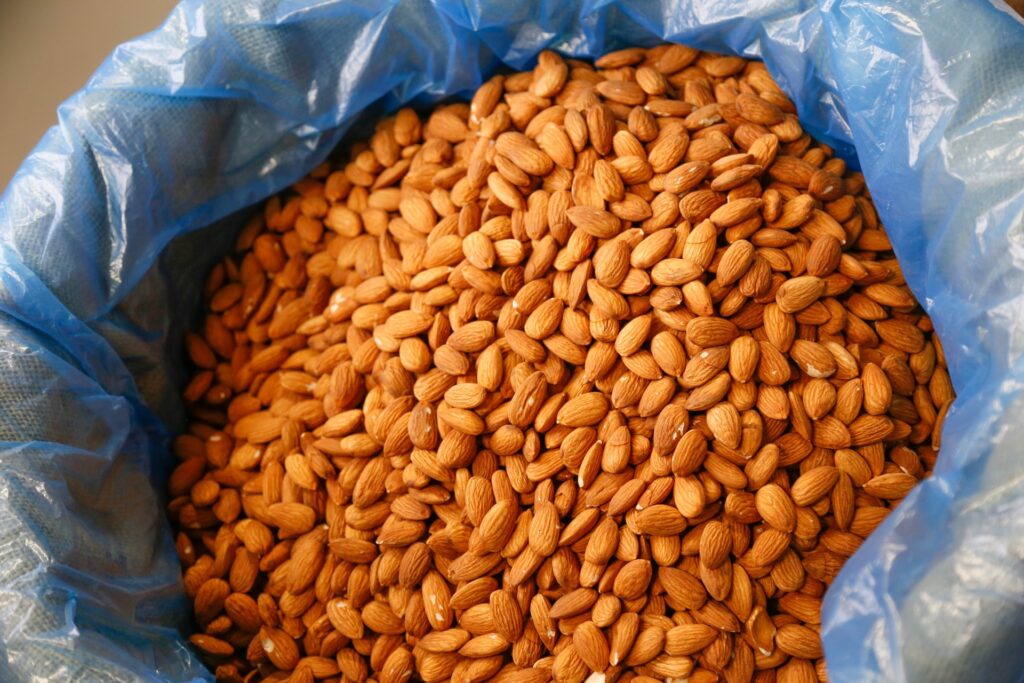A healthy diet is an important part of a healthy lifestyle throughout your life, but especially crucial if you’re pregnant or planning to get pregnant. Healthy eating keeps you feeling good and provide your baby with the essential nutrients they need inside your womb.
When it comes to pregnancy, mothers are quite mindful of their eating. They only stick to the food items that are good for their baby’s health which is why they have so many questions about certain foods. In this article, we are going to be talking about almond in pregnancy and the benefits of almond in pregnancy.
Some of the basic questions that are related to the topic are; do you need to take almonds in pregnancy? Whether they are good for the baby or not and if they are good then what are the benefits of almonds? How many almonds to eat per day during pregnancy?
Well, there are a few more so keep reading the article to find out the answers.
Table of Contents
Nutritional value of almonds
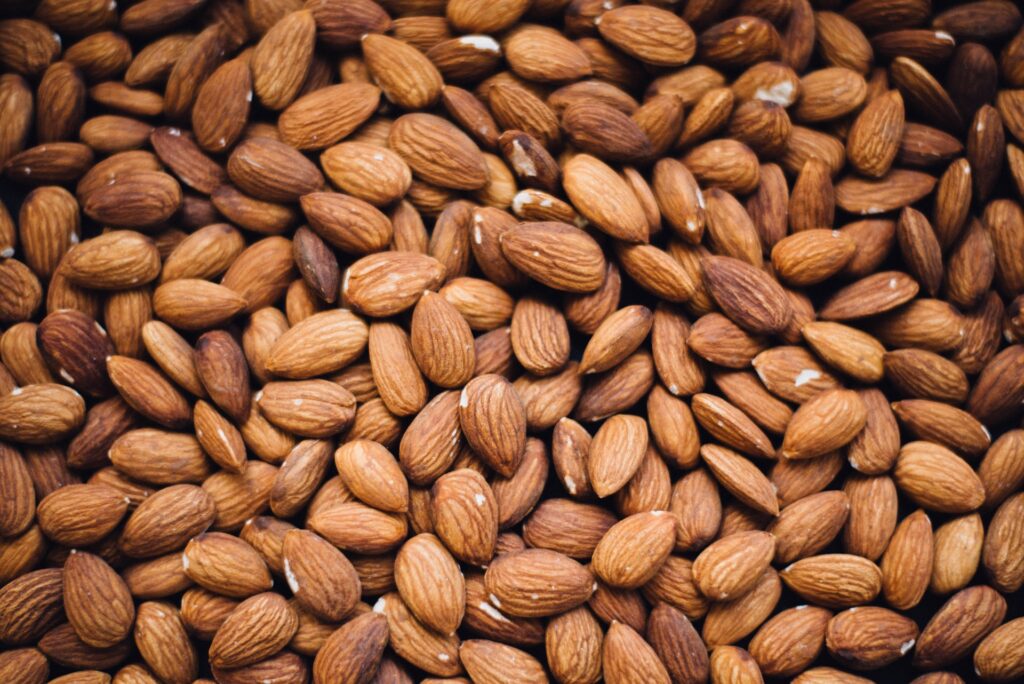
Almonds are one of the world’s most famous tree nuts. Almonds provide an enormous amount of nutrients. They are highly nutritious and rich in antioxidants, healthy fats, minerals, and vitamins.
Almonds are one of the healthiest nuts that exist. The composition of almonds is packed with all the healthy nutrients and minerals that help your body function properly. The nutritional value of almonds per 100 grams is;
- Energy – 576 Kcal
- Carbohydrates – 21.69 grams
- Fat – 49.42 grams
- Protein – 21.22 grams
- Vitamins – Beta Carotene, A, B1, B2, B3, B5, B6, B9, Choline, E, K
- Trace Metals – Calcium, Iron, Magnesium, Manganese, Phosphorus, Potassium, Sodium, Zinc
Almonds have a good amount of antioxidants content that can protect your cells from oxidative damage, which is a major contributor to disease and aging. The health benefits of almonds are: it decreases blood sugar levels, lowers blood pressure, and adjusts cholesterol levels. So, almond during pregnancy is amazingly beneficial.
Eating almonds during pregnancy is safe or not?
Generally, women tend to avoid consuming dry fruits and nuts during pregnancy due to their fat content and high heat.
The fact is, almonds are safe to be consumed during pregnancy. Rumors and myths that eating nuts during pregnancy render the unborn baby with nut allergies are deficient in scientific basis. The only condition to avoid them is if you are allergic to them.
There are certain myths related to the consumption of almonds during pregnancy. If you have any grandparents in the family, then you must have heard them tell you that almonds are not good for the baby because the baby could be allergic to it so you should avoid them during pregnancy. But those are all myths that are not backed by single scientific research.
The fact is that almonds are completely safe to consume during pregnancy if you consume them moderately and after consulting your doctor. The reason is that almonds are packed with some essential nutrients, minerals, and vitamins that are healthy for you and the baby. The basic nutrients that make up an almond are;
- Fiber – A nutrient that helps in proper digestion.
- Vitamin E – An essential vitamin that keeps our skin and hair healthy
- Magnesium, Riboflavin, and Folate (Vitamin B9) – These minerals and vitamins are required for maintaining the nervous system of the human body, thus help in proper brain functioning.
- Manganese – This is a mineral that regulates the bodyweight of the mother and the child.
By looking at the number of beneficial nutrients that compose an almond, we can for sure say that they are not harmful during pregnancy if consumed moderately.
Yes, if you consume a whole bunch of them daily that they might have some side effects because as the saying goes that excess of everything is bad. The same is the case with almonds.
So consult your doctor before you start consuming them and set a limit per day so that you don’t overeat them and we are sure that you would be good to go.
Raw or Soaked Almonds during Pregnancy
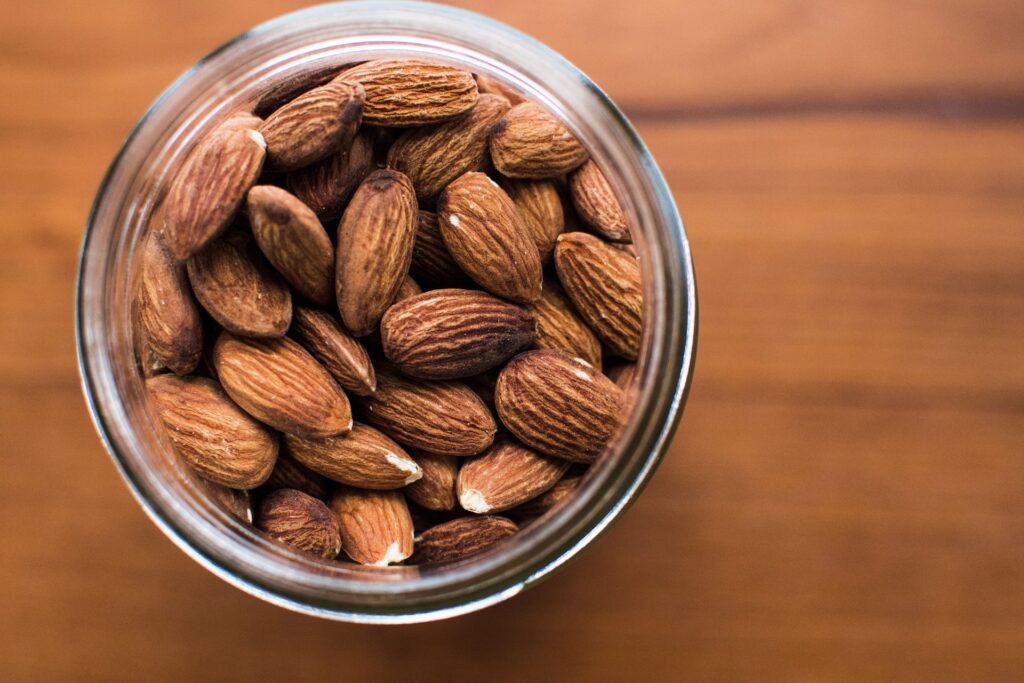
There are multiple ways that you can consume almonds during pregnancy. Some people like to consume raw almonds, whereas some would prefer soaked almonds. There are certain myths related to the consumption of raw almonds during pregnancy, but they are all false.
Raw almonds are packed with nutrients rich in iron, calcium, folic acid, and fiber whereas consumption of soaked almonds during pregnancy aids in the process of digestion.
There are certain questions regarding the raw and soaked controversies. Some would say that one is better than the other one. Our research has shown that soaked almonds are better than raw almonds when it comes to pregnant women.
So the question is how many soaked almonds to eat a day in pregnancy and why are they better than raw almonds. We will discuss the number of almonds later, but the reasons that the soaked almonds are better than raw almonds are:
1. Degenerates phytic acid
Phytic acid is an acid that is present in tree nuts and improves the life and the quality of the nuts, but on the other hand, it also slows down the absorption of the nutrients in our body. So soaking the almond removes the outer brown layer that contains phytic acid and releases other minerals such as phosphorus that are beneficial during pregnancy.
2. Neutralizes enzyme inhibitors
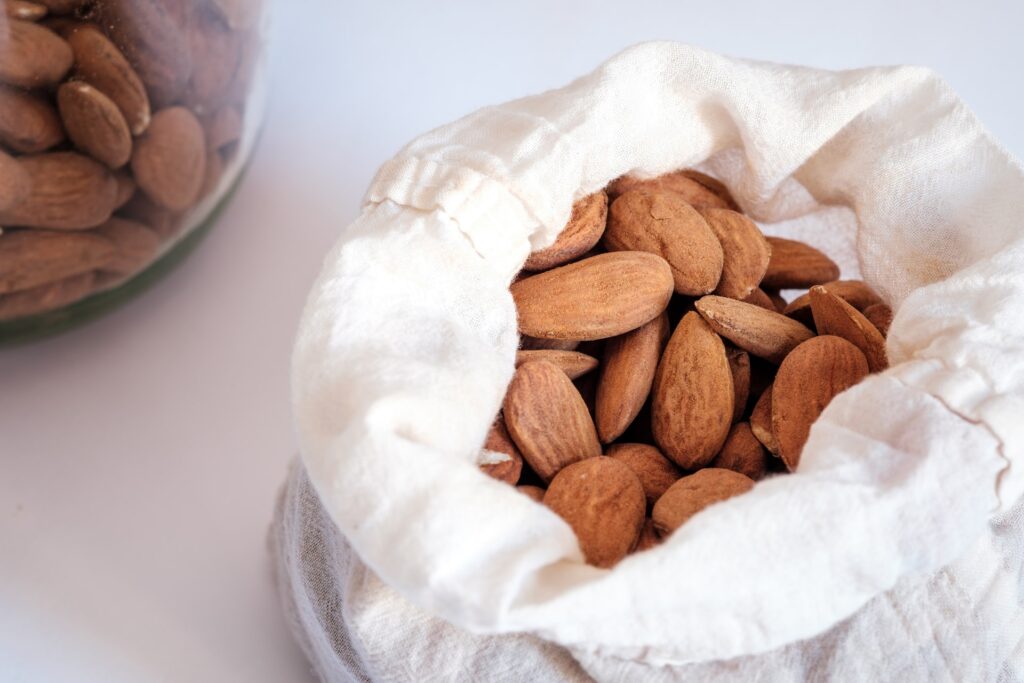
Raw almonds come with some enzyme inhibitors that act as a hurdle in the degeneration of gluten enzymes which is why soaking them overnight with some salt helps neutralize the enzyme inhibitor.
When the enzymes are neutralized, they aid in gluten digestion and eases the digestion process. Along with the neutralization of enzyme inhibitors, soaking also aids in the release of other beneficial enzymes that enhance the bioavailability of vitamins in nuts.
3. Neutralizes tannin
Almonds contain tannin that gives it a yellowish color. Along with the color, it also gives the almonds a kind of a bitter taste. Soaking the raw almonds in water removes the tannin layer and makes the almonds taste a bit sweeter.
Top Almond Benefits during Pregnancy
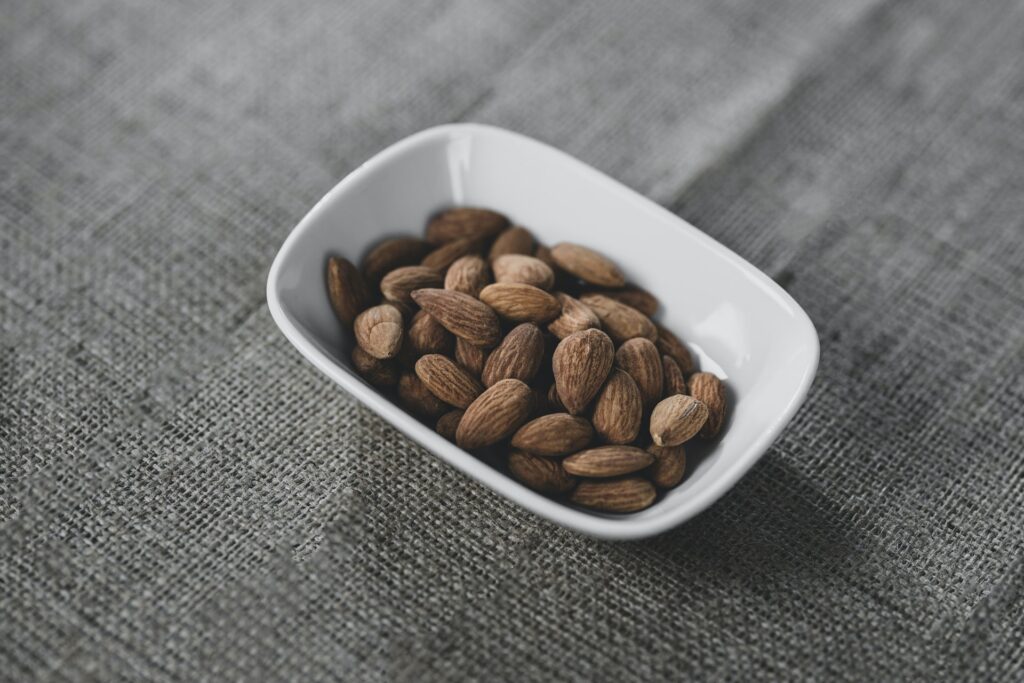
As we have said before, almonds are great for your pregnant health.
There are certain benefits linked to the consumption of almonds during pregnancy that are proved by scientific research. Some of those benefits are;
Eating a fistful of soaked almonds early in the morning is an age-old tradition. However, during pregnancy following this habit can be advantageous — both for you and your baby. Soak at least five to six almonds in a bowl of water and peel off its skin in the morning before eating. If you think why this practice is advised especially during pregnancy, here are the reasons:
1. Reduces allergies in babies
Research done by Danish experts on the maternal intake of tree nuts (as almonds are also a type of tree nuts) and fetal well-being concluded that mothers who had nuts during pregnancy had fewer chances that their babies will suffer from allergies like asthma or any other respiratory diseases after birth.
However, the utilization of almonds during pregnancy reduced the overall risk of developing allergic diseases in children.
2. Helps ease constipation
As we know, almonds are a loaded source of fiber; they also help to deal with the symptoms of constipation that is ordinary during pregnancy.
- Calcium: It is a known fact that utilizing calcium during pregnancy is essential for bone development of the baby, but only a few know that adequate calcium intake can also reduce the risk of pre-eclampsia as well. Calcium also guarantees the growth of nerves and muscles. A single ounce of almonds provides 75 mg of calcium and can be a healthy addition to your diet
- Folate: Folate found in almonds guards the baby, while it is still in the mother’s womb, from neural tube defects. It also helps in the development of the nervous system and bones. Birth-defects are also prohibited by folate
- Copper: Copper plays an important role in utilizing iron in the body. It also helps with bone and muscle development
- Riboflavin: Almonds have a good amount of Riboflavin in them. It makes certain the baby’s brain development. It is also valuable for muscle and bone development.
- Iron: Almonds are a rich source of iron. Iron plays important role in carrying oxygen in the body. As your blood volume grows during pregnancy, a deficiency of iron may result in the lack of red blood cells in your body, which may make you feel fatigued and tired. It can also cause pregnancy anemia
- Fiber: Almonds are rich in fiber that is why almonds are especially recommended to pregnant women with constipation problems. The fiber in almonds will ensure smooth bowel movements and aid digestion
- Manganese: Manganese is involved in regulating and maintaining both the mother and the baby’s weight. It enhances healthy metabolism and thyroid function. It also helps in the development of bones, and it also balances blood sugar
- Magnesium: Magnesium is involved in smooth bowel movement. It helps in the development of the baby’s central nervous system and bones
- Proteins: The protein content in almond will provide the mother with strength for the delivery. It will also keep the baby’s weight in balance
- Omega 3: Omega 3 is essential for the baby’s brain development. It also aids in the development of the baby’s eyes
- Vitamins: Almonds are a rich source of vitamins. It contains vitamin E, C, K, B6, and A. Vitamins are essential for the overall growth of the baby, and they also help to keep deadly diseases and defects at bay
- Phosphorous: Phosphorous content in almonds help with congenial growth. Phosphorous also helps with blood clotting during pregnancy
How Many Almonds Should a Pregnant Woman Eat a Day?
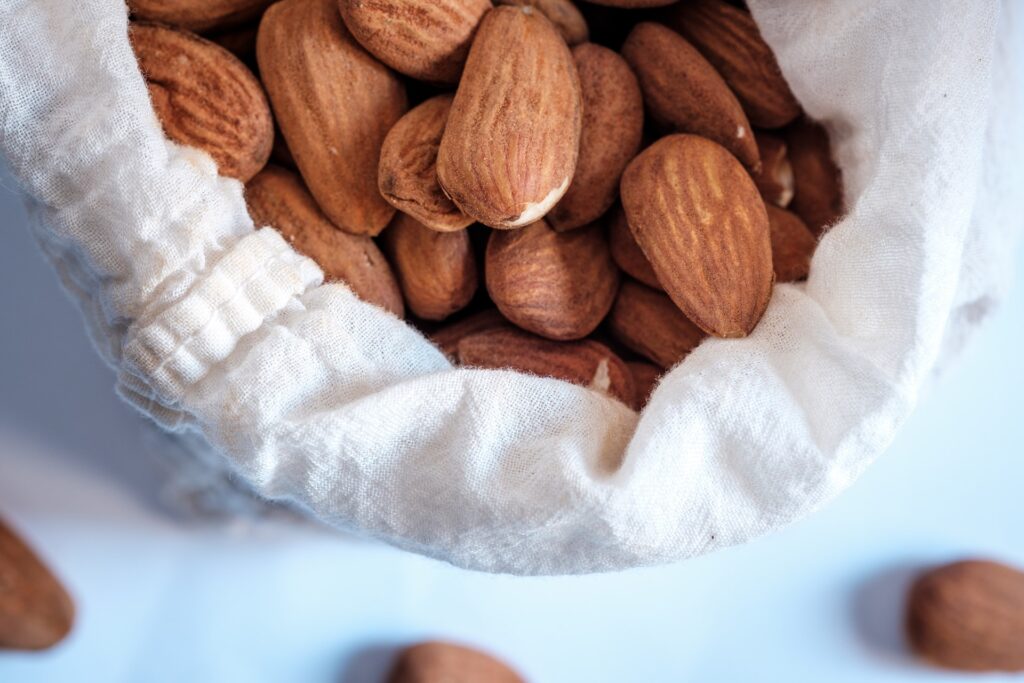
There are many women out there that already knew that almonds were good for pregnancy and all the myths related to them are false, but they all have one basic question which is how many almonds should a pregnant woman eat a day?
The question is valid because you don’t want to consume too many of them because they can be harmful.
According to many doctors and dietitians, the best quantity of almonds that pregnant women should consume during pregnancy each day is one ounce.
For those how are unaware of the units of measurements, one once is equal to 28 grams of almonds. The breakdown of the nutritional benefits of 28 grams of almonds is;
- Calories – 164
- Fat – 14.36g
- Carbohydrates – 5.6g
- Proteins – 6.03g
One ounce of almonds is an average amount that you must consume, but this doesn’t mean that you have to consume them all at the same time.
You can divide the total number of almonds throughout your day. For example, for better results, you can consume ten soaked almonds in the morning and the rest ten at night before going to bed.
The best way to plan your routine is to consult your doctor beforehand and act on his or her advice on how many almonds during pregnancy are good for you because each mom suffers through different conditions during pregnancy, so the consumption varies from person to person.
How to eat almonds during pregnancy?
The other question that we get from mothers apart from how many almonds during pregnancy is how they can consume almonds during pregnancy. Well there are quite several ways that you can consume almonds on daily basis, and some of those ways are;
1. Raw almonds
You can also eat them raw as a quick snack after washing and drying.
2. Soaked almonds
Soaking the almonds overnight removes toxins from its coat, decomposes its gluten content, and releases phytic acid. This makes it a much healthier alternative to consuming them raw.
3. Almond milk
Though not as healthy as cow’s milk, almond milk is still highly nutritional and provides a great choice for those who are lactose intolerant.
4. Almond butter
Making the almonds into a food paste gives you almond butter. Adding water to it gives almond milk. Almond butter is a great source of proteins, fiber, and healthy fats, and also reduces bad cholesterol.
Mixing almonds with raisins and dates decrease the Pitta aggravation in blood. Pitta is present in the digestive tract and can cause heartburn when not maintained at the right level.
You can also use finely dice the soaked almonds, and you can sprinkle on different dishes such as salads, oatmeal, and yogurt. It will give a rich and crunchy taste to the dish.
Bake some almonds along with homemade muffin and bread recipes for a nutritional boost. Give it a try!
Registered dietitian Frances Largeman-Roth suggests on the BabyCenter website making a trail mix with raw almonds, pumpkin seeds, dried tart cherries, and dark chocolate chunks. Dark chocolate? Oh yes!.
What Are The Possible Side Effects Of Eating Almonds In Pregnancy?
These effects are not severe and you can easily avoid them.
1. Weight gain:
Though almonds increase good cholesterol levels in the body, eating too many may lead to weight gain as they contain high calories and fats.
2. Medication interactions:
Almonds are a rich source of manganese where one ounce gives around 0.6mg of the mineral. Manganese helps in various body functions. But a high level of the mineral poses the risk of pre-term delivery.
3. Gastrointestinal issues:
If you are eating almonds along with a high fiber diet, it could lead to gastrointestinal issues such as bloating, constipation, and abdominal cramping because your body will not be able to process too much fiber.
What Safety Measures Should You Take before Eating Almonds?
Here is what you can do to add almond to your diet:
- Talk to your doctor before planning to add almonds to your diet.
- Buy almonds from reliable brands.
- Wash the almonds thoroughly before using to wash off any harmful germs or dust on their surface. Packaged varieties have fewer chances of having a bacterial infection
- Consume them in a natural state. Avoid the other varieties found in the market such as salt coated, sugar-coated.
Conclusion
Almonds are as close to perfect as a food can get.
Keeping in mind, the numerous advantages that this nut offers, non-allergic pregnant women should incorporate almonds into their diets. But do not forget to always eat them in moderation, as consuming too much can have bad repercussions.
The benefits of soaked almonds are much more as compared to when you eat them in raw form. Space the consumption evenly and enjoy good health and happy pregnancy.


